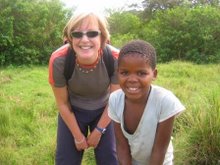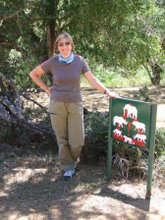Imagine this: We've entered the country and been given three days to "register" - a costly bureaucratic process all "aliens" are required to do, in addition to getting a visa; it's about 40 degrees; we've spent the night in an expensive, bug-infested hotel and have had too little sleep. The alien registration process begins at our hotel as we are required to present evidence of our place of residence. This was slightly complicated as we shifted hotels after one unsatisfactory night at The Central, to the nearby Badr Tourist Hotel, only a marginal improvement, but a big reduction in cost from 95 Sudanese pounds to 65. Luckily the Badr had the forms, and dug a set out for us. Even more luckily, Sarah, a Swedish woman we'd last met at the Sudanese Embassy in Addis, returned to the Badr, told us that the Alien Registration Office had recently moved to near the American Embassy, and advised that we get the hotel to stamp and sign all three forms. She has returned to do just that.
Gathering ourselves for the unknown, we stepped out into the bright sunlight and followed our map to the American Embassy, and then asked directions to the registration office, which was down a nameless alley, and unsignposted until we were almost upon it. Once inside the shadeless compound, notable for its complete lack of any information about the process, documentation required, or costs, in any language, we eventually figured out by attrition which window to go to. The first step was to get all our paperwork in order, and signed and stamped. This meant going over the road to get a photocopy of our Sudanese visa and entry stamp, and putting it together with the hotel forms and a passport photo. This step was accomplished by lunchtime. At this stage we were being bounced from window to window - we can't take your money till you have a sticker (a small postage stamp-like sticker placed on our bundle of signed forms); we can't give you a sticker till you've paid. It's hard to convey how dispiriting this was, given the heat and the complete mystery of the process we were trying to complete. We all gave up and went to lunch - they said come back at 2pm (actually, they said come back tomorrow, but our reaction to that made them revise this!). At 2pm promptly we were back in the sunny courtyard, and there we stayed till 3.30pm when the staff came back from lunch!!! Still, in their favour, now that the cashiers had had a break they were in a much better mood, and the need for the postage stamp somehow disappeared. Our passports and forms were submitted, along with great piles of others for various NGOs and Chinese workers (who sensibly use professional registration-getters who know the system). Max had no hesitation in pulling ours out of a pile and placing them in front of the cashier for relatively immediate attention. We paid our money, got our receipt, queued up at another window and by 4.30 had our registration stickers in our passports. Whew!
We finished the day by meeting up with Max (a young German student) at the Badr, who was trying to get a room and failing to do so, and wandering round the neighbourhood with him looking for another hotel. It was enough to make us realise that the Badr wasn't the worst place in town by any means. But, eventually we ended up at the Al Nakheel, a lovely place and only 50 pounds. Max found his German mate Yannick there, and we headed out to dinner that night together with Bruno, a French-Canadian and Andrew from York (no, not the prince!).
Everyone has similar stories to tell about the registration process, and for everyone else who planned to go to Port Sudan, they have the joy of facing a similar process to get travel permits (required for travel in much of the country). We are only planning to go to the railway station and buy a train and ferry ticket. Should be a breeze!
It's a funny thing, but I didn't expect Sudan to be better off than Ethiopia, but it seems to be. Comparing Khartoum to Addis, the power doesn't go off unexpectedly every day, it appears there are more cars, more people smoke and wear spectacles, the small stalls aren't run by children but by adults, there are far fewer beggars, the roads are in better repair, and it's certainly more expensive. The internet services are the fastest and the best we've come across on the entire continent.
People are always keen to try out their English, and in Ethiopia they were often quite a pain, tagging along for ages and generally bugging us. Here, so far anyway, people have been content to almost mumble to themselves "welcome to Sudan" as we pass by, or they shout out "hello" and grin when you say "hello" back to them. We have been bought cups of tea, the water stall owner raced out and gave me change from the day before, the juice stand gave us an orange and a free juice top up today and took our photo. People are always keen to help us with the buses and directions. They are friendly without being obsequious, kindly and good natured. They are also very aware that Sudan doesn't have a good international reputation, and anxious that our experience here is positive. Apart from the bureaucracy, it has been.

Our favourite juice guy - he sells half pints of fresh mango juice for the equivalent of US50 cents.




No comments:
Post a Comment